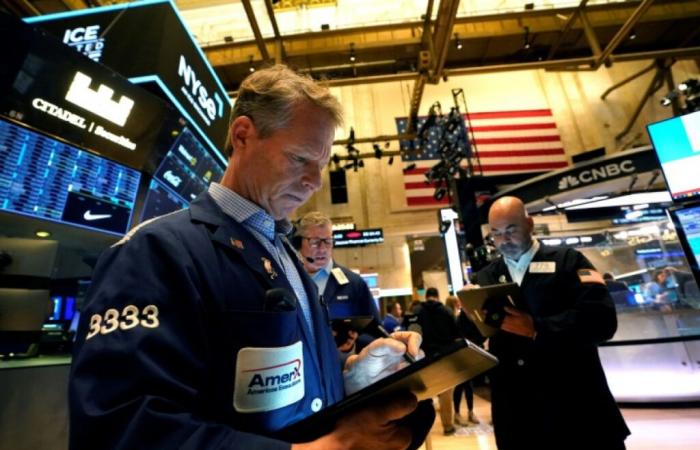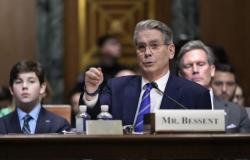Operators of the New York Stock Exchange (AFP / TIMOTHY A. CLARY)
The New York Stock Exchange opened lower on Thursday, catching its breath after the surge the day before due to an inflation index more moderate than expected, while digesting a new wave of corporate results.
Around 3:20 p.m. GMT, the Dow Jones dropped 0.21%, the Nasdaq index lost 0.13% and the broader S&P 500 index was close to balance (-0.05%).
“Today is an assimilation (by the market) of the surge in prices from the day before,” Sam Stovall, CFRA analyst, commented to AFP.
The consumer price index (CPI) published on Wednesday “having been slightly lower than expected (…), this pushed the market up”, he continued.
The index showed an acceleration in inflation for the third month in a row, but its level (+2.9% over one year) is in line with analysts’ consensus.
Above all, markets have retained the improvement in so-called core inflation – which excludes volatile food and energy prices. This slowed down to 3.2% over one year, compared to 3.3% anticipated.
Thursday also brings its share of indicators, including retail sales, which amounted to $729.2 billion in the month of December, or 0.4% more than in November, according to the data published by the Department of Commerce.
This is less than expected by analysts, who expected a less marked increase than the previous month, but rather of around 0.5%, according to the consensus published by MarketWatch.
Furthermore, weekly unemployment registrations for the first week of the year came out above expectations, at 217,000. Analysts were counting on 210,000.
“Heavy snowfall in the Midwest appears to have boosted initial claims last week, likely by forcing a halt to many construction sites,” Samuel Tombs, chief economist at Pantheon Macroeconomics, observed in a note.
Wall Street is also adopting a wait-and-see posture before Donald Trump’s return to the White House on Monday, awaiting details on the implementation of the inflationary policies desired by the Republican, particularly on customs duties.
During the American presidential campaign, Mr. Trump indicated that he wanted to impose 10 to 20% customs duties on all products entering the United States, and even up to 60% or even 100% on those coming from China.
Investors are “still trying to determine whether tariffs will be a reality or whether they will remain a negotiating tool,” according to Mr. Stovall.
The bond market tightened slightly on Thursday after having fallen significantly the day before: the yield on ten-year American government bonds stood at 4.67% compared to 4.65% the day before at close. On the two-year maturity, it stood at 4.29% compared to 4.26%.
Elsewhere, on the stock table, after Goldman Sachs, Citigroup and JPMorgan on Wednesday, it was the turn of Bank of America and Morgan Stanley to reveal their fourth quarter results before the opening.
Bank of America progressed slightly (+0.35%) after announcing results above expectations for the fourth quarter, thanks to commissions received in asset management, investment banking and brokerage.
Revenue in the fourth quarter reached $25.35 billion, 15 percent better than the same period a year earlier, and net profit more than doubled to $6.40 billion from $2. 84 billion a year earlier.
For its part, the American investment bank Morgan Stanley was well sought after (+1.88%) after having obtained sharply increasing results in the fourth quarter, clearly above expectations, boosted by the ramp-up in equity activities.
Net profit stood at $3.7 billion, a figure more than doubled compared to the same period of the previous year (+142%).
“The financial sector is off to a good start,” said Mr. Stovall, who also notes “a renewed sense of optimism regarding the outlook for 2025.”
The UnitedHealth group, second weighting in the Dow Jones, fell (-3.79%). The company, which published its quarterly results on Thursday, suffered in particular from medical costs considered too high and a turnover below expectations.
Nasdaq






